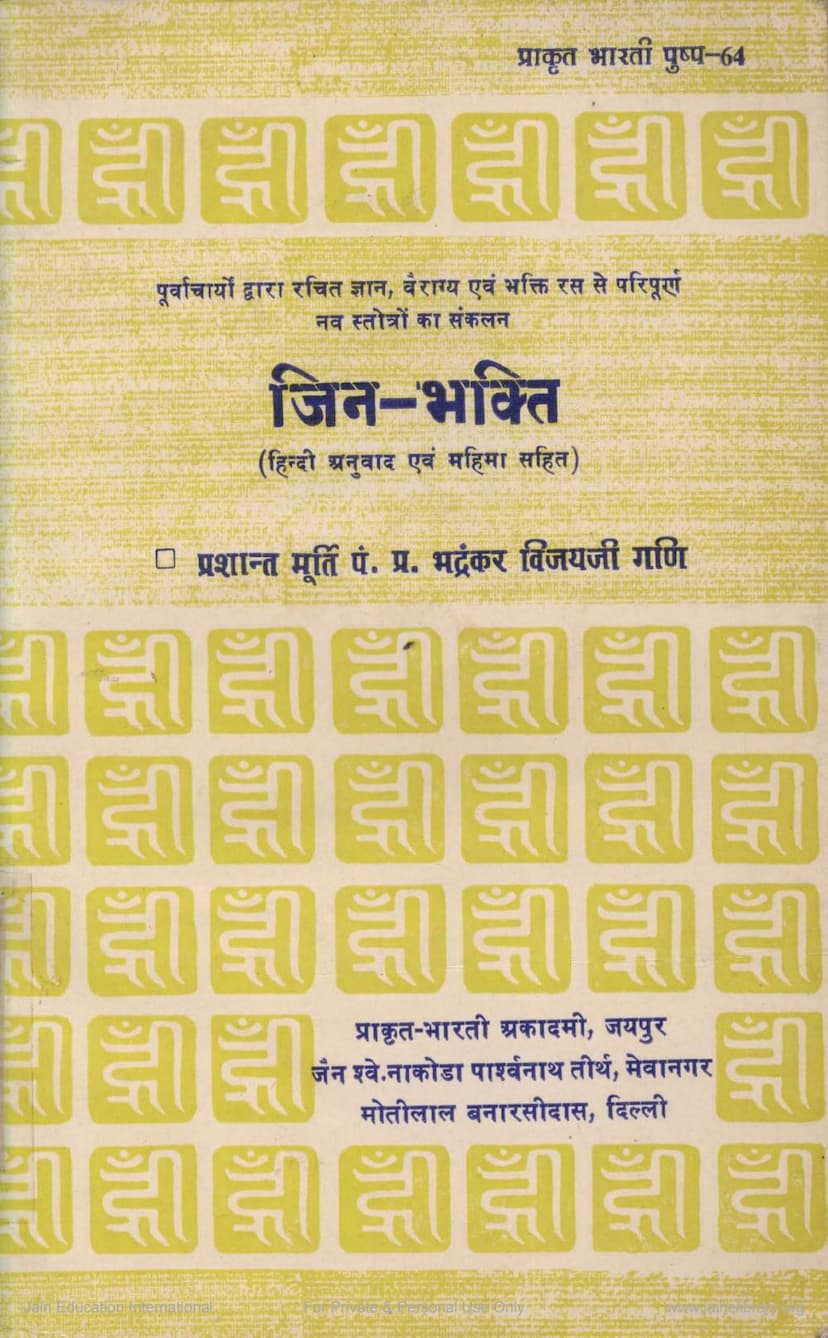Jina Bhakti
Added to library: September 2, 2025

Summary
Here's a comprehensive summary of the Jain text "Jina Bhakti" based on the provided pages:
Book Title: Jina Bhakti (Devotion to the Jina) Author: Munishri Bhadrankarvijay Ganivarya Publisher: Prakrit Bharti Academy, Jaipur (along with Jain Shvetamber Nakoda Parshvanath Tirth, Mewanagar and Motilal Banarsidas, Delhi) Catalog Link: https://jainqq.org/explore/002534/1
Overview:
"Jina Bhakti" is a collection of nine devotional hymns (stotras) composed by esteemed ancient Jain scholars and saints. These hymns are filled with knowledge, detachment (vairagya), and devotional sentiment (bhakti rasa) dedicated to the Jinas, the liberated souls who have conquered their own passions and the cycle of birth and death. The book provides the original Prakrit/Sanskrit verses, their Hindi translation, and an exposition on their significance.
Key Themes and Content:
-
Purpose of the Collection: The book aims to instill and deepen devotion to the Jinas in the hearts of aspiring spiritual seekers. It emphasizes that true devotion is crucial for spiritual progress and for realizing the true nature of the Jinas.
-
Importance of Jina Bhakti: The preface and introduction highlight that Jina Bhakti is considered a primary means to liberation (moksha). It's presented as a powerful force that helps the soul progress from an external focus to an internal realization of the divine within. This devotion is described as an unwavering faith and deep respect for the Jinas as the ultimate well-wishers and saviors of all beings.
-
The Nature of the Jinas: The stotras describe the Jinas as omniscient, free from all impurities and attachments, the ultimate teachers, and the embodiments of infinite knowledge, perception, bliss, and power. They are portrayed as detached from worldly affairs, yet benevolent towards all beings.
-
The Power of Stotras: The text emphasizes that the stotras composed by ancient Acharyas are potent tools for recognizing the true nature of the Jinas. Regular recitation, contemplation, and remembrance of these stotras help purify the mind, destroy the poison of false belief (mithyatva), and foster right faith (samyagdarshan).
-
Authors and Hymns Included: The collection features hymns by revered figures in Jain tradition, including:
- Shri Siddhasen Divakar Suri: Known for his early devotional poetry, his hymn "Shri Vardhaman Dvātrinśikā" is presented as simple, profound, and beneficial for all.
- Shri Siddharshi Ganivarya: Author of "Upmitibhavaprapanchakatha," his "Shri Jina Stavan" is included.
- Mahakavi Dhanpal: His "Shri Rishabha Panchāśikā" is highlighted for its simplicity, clarity, and essence of knowledge, detachment, and devotion. Even Acharya Hemachandra is said to have used it.
- Acharya Hemachandra: The great Kalikal Sarvagya (omniscient of the Kali age) is represented by "Ayogavyavachhedika" and "Anyayogavyavachhedika," which, despite being inspired by earlier complex works, are simplified for understanding. He is also credited with the "Shri Vitraag Stotra," composed for King Kumarpal's daily study.
- Maharajadhiraj Shri Kumarpal: The devout king, influenced by Acharya Hemachandra, contributed "Sadharan Jina Stavan," described as deeply moving and capable of immersing the devotee in devotion.
- Mahopadhyaya Shri Yashovijayaji: A prominent logician and philosopher, his hymns "Paramajyotiḥ Panćavinśatikā" and "Paramātma Panćavinśatikā" are included, summarizing the essence of devotional texts.
-
Distinction from Other Devotions: The book implicitly and explicitly distinguishes true Jina Bhakti from devotion to other deities or materialistic pursuits. It emphasizes that the devotion to Jinas is purely for spiritual upliftment and liberation, not for worldly gains. The stotras often contrast the qualities of the Jinas with those of other deities described in popular traditions, highlighting the Jinas' transcendence.
-
The "Jina Bhakti" (Devotion to the Jina) Chapter: This section further elaborates on the nature of Jina Bhakti, defining it as the unwavering faith and deep reverence for the Jinas as the sole providers of ultimate well-being and liberation. It stresses that true devotion leads to the realization of the soul's inherent divine nature.
-
The "Mahima" (Glory) Chapter: This section, likely an introduction or appendix, focuses on the glory and importance of Jina Bhakti, calling it the primary means to liberation. It speaks of the immeasurable power of devotion in developing spiritual practices and guiding the soul towards its ultimate divine state.
-
Structure of the Book: The book begins with introductory remarks from the publishers and the compiler. It then presents the stotras, each preceded by its author and title, followed by the Hindi translation and explanations. An index lists the stotras and their respective page numbers.
-
The Stotras Themselves: The summary of each stotra's content reveals common themes:
- Praise of the Jinas' attributes: Omniscience, purity, detachment, compassion, liberation from the cycle of rebirth, freedom from passions and karma.
- Contrasting the Jinas with other beings/deities: Highlighting the Jinas' uniqueness and superiority.
- The devotee's supplication: Expressing the devotee's longing for liberation, their struggles with worldly attachments and karmic obstacles, and their reliance on the Jinas' grace.
- Metaphors and Similes: The stotras employ rich imagery, comparing the Jinas to the sun, moon, kalpa-vriksha (wish-fulfilling tree), and oceans of nectar, to convey their glory and the benefits of devotion.
Overall Significance:
"Jina Bhakti" serves as a valuable resource for Jain scholars, practitioners, and anyone interested in the devotional aspects of Jainism. It provides access to profound and inspiring hymns that can guide individuals on their spiritual path, fostering a deep and unwavering connection with the liberated souls, the Jinas. The compilation is a testament to the rich devotional literature within the Jain tradition.